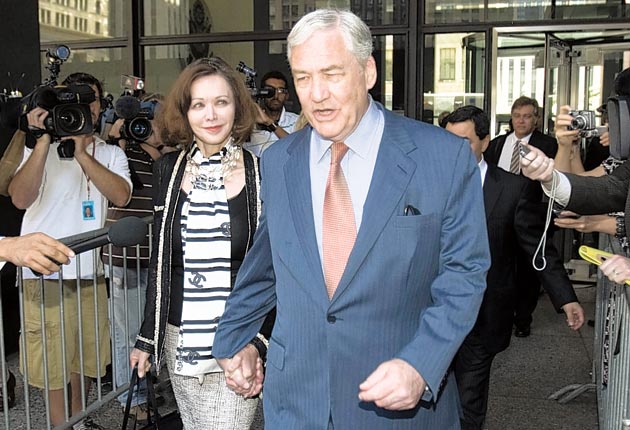Conrad Black is free, but financial affairs still haunt him

Your support helps us to tell the story
From reproductive rights to climate change to Big Tech, The Independent is on the ground when the story is developing. Whether it's investigating the financials of Elon Musk's pro-Trump PAC or producing our latest documentary, 'The A Word', which shines a light on the American women fighting for reproductive rights, we know how important it is to parse out the facts from the messaging.
At such a critical moment in US history, we need reporters on the ground. Your donation allows us to keep sending journalists to speak to both sides of the story.
The Independent is trusted by Americans across the entire political spectrum. And unlike many other quality news outlets, we choose not to lock Americans out of our reporting and analysis with paywalls. We believe quality journalism should be available to everyone, paid for by those who can afford it.
Your support makes all the difference.Conrad Black, the disgraced media mogul, has been told he cannot return to his native Canada to await a new verdict on the fraud charges he faces, because he hasn't provided enough detail about his muddy financial affairs.
The former proprietor of The Daily Telegraph, who was freed on bail this week after two-and-a-half years in prison in the US, gave a thumbs-up sign as he entered the court building for a hearing in Chicago, hand in hand with his wife, the columnist Barbara Amiel.
The pair are holed up at the swanky Four Seasons hotel in Chicago while Black's lawyers press for him to be allowed permission to leave the country, but federal district court judge Amy St Eve last night agreed with prosecutors who said the couple had provided only vague financial information.
Without a more-complete picture, the judge said she cannot decide on the proper terms of bail or whether the peer has the means to evade US justice.
Black, whose newspaper empire was once the third largest in the world, lost it all after outside investors accused him of running a "corporate kleptocracy" in which he and his business partners enriched themselves at shareholders' expense. He was convicted in July 2007 on three counts of fraud – which are now being re-examined – and one charge of obstruction of justice, receiving a sentence of six-and-a-half years.
He was released from the low-security Coleman correctional facility which has been his home since March 2008, and from where he has protested his innocence as vigorously as he did before his trial, when he said the case was "hanging like a toilet seat" around the necks of prosecutors. The Blacks still have the use of the Palm Beach mansion they used to own, but that is up for sale, and the peer's lawyers told the court yesterday that Ms Amiel has a minor medical condition that makes it difficult for her to live in Florida.
Judge St Eve said she would rule on whether Black can travel to his home in Toronto at another hearing on 16 August. "There's a lot of uncertainty," she told his lawyers. "I want more certainty than this. I need more to make a fully informed decision."
A family friend, the New York businessman Roger Hertog, posted a $2m bail bond ahead of Black's release on Wednesday, but the judge said she wanted to be clear if he has assets of his own that he can pledge as security. The Sunday Times Rich List pegged his net worth at £136m at the peak of his influence in 2003, but he was forced to sell assets to meet a blizzard of legal bills.
As well as fighting to clear his name, Black and his lawyers have been contending with a tangle of other legal and financial issues, including a $71m tax bill from the US Internal Revenue Service related to the perks Black enjoyed from his newspaper company, plus penalties. He is also being sued by the Securities and Exchange Commission, which regulates stock market-traded companies.
It is a month since the US Supreme Court ordered a fresh look at Black's three fraud convictions in the light of a decision that narrows the scope for securing white-collar criminal convictions. Prosecutors will no longer be able to argue that failing to provide "honest services" to a company amounts to fraud. An appeals court must decide if that argument played a role in the jury's thinking when they convicted Black and three associates of skimming $6.1bn from his company. The money was taken by placing bogus clauses into the sale of newspaper businesses, the jury decided, then hiding them in the small print of documents so the board didn't notice.
An appeals court will have to decide whether to uphold or quash Black's convictions, or order a retrial, and then re-examine his prison sentence.
Join our commenting forum
Join thought-provoking conversations, follow other Independent readers and see their replies
0Comments